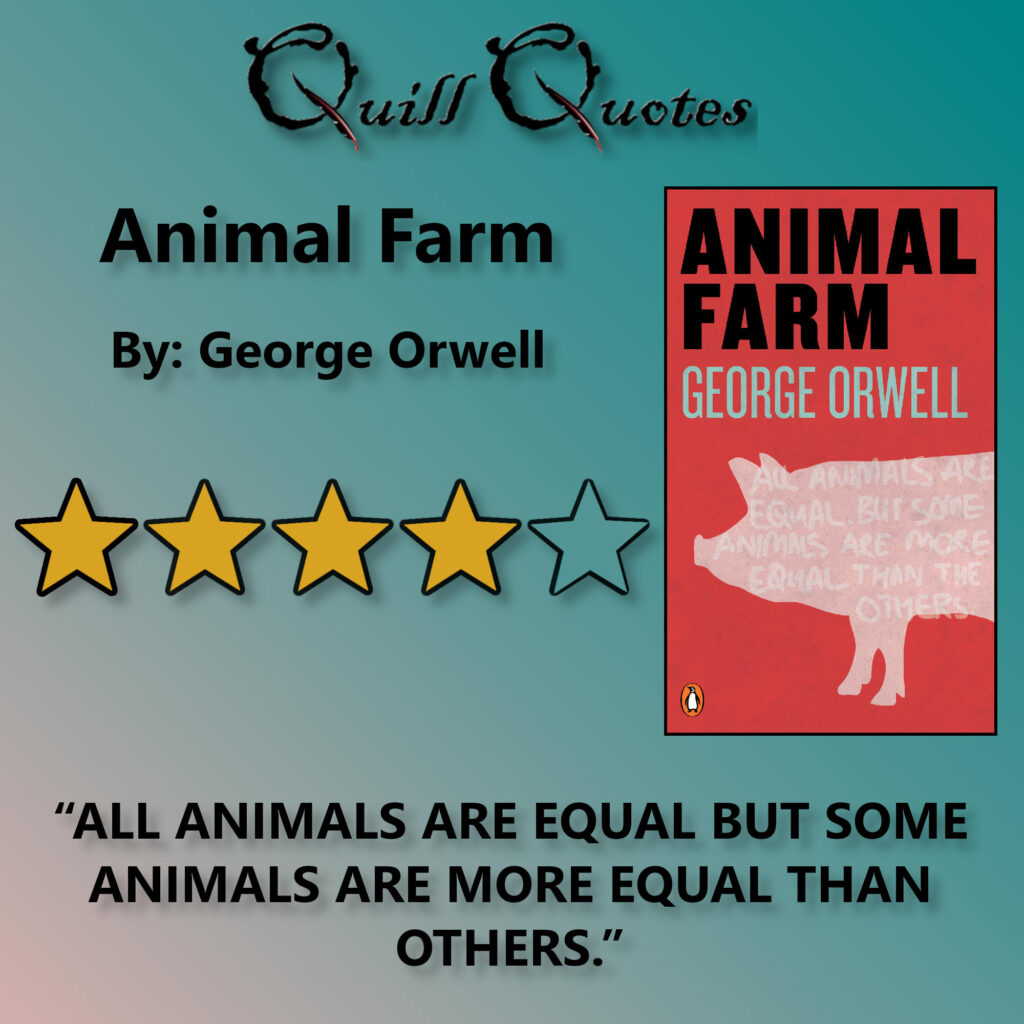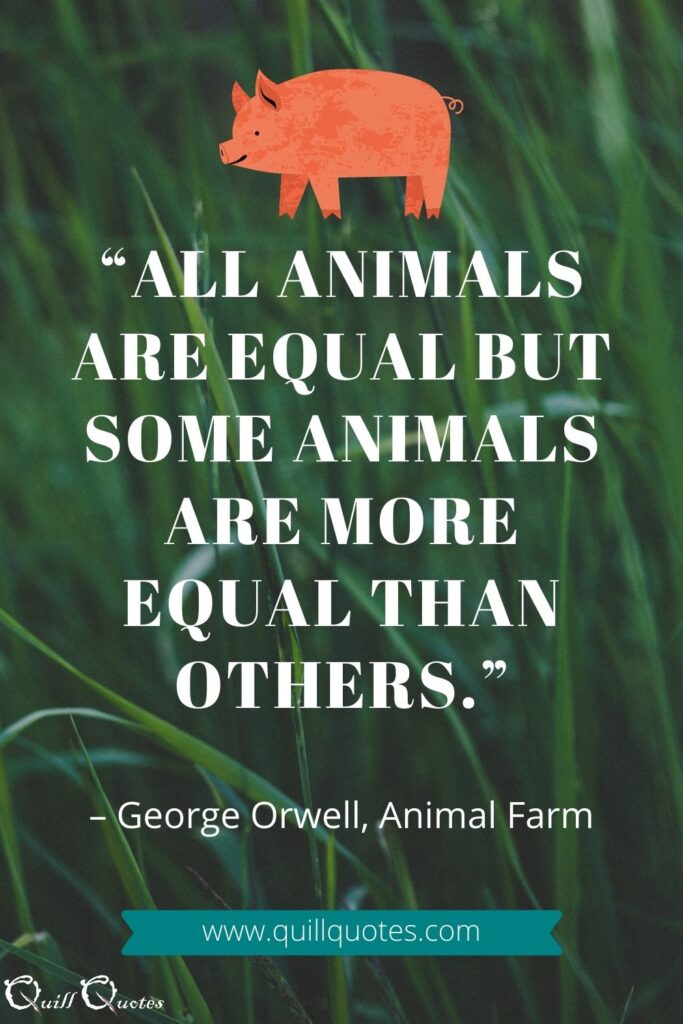George Orwell’s classic, Animal Farm, is an entertaining and cautionary tale that everyone should read. Orwell himself described the book as “a satirical tale against Stalin” and the parallels to the Russian Revolution of 1917 and Stalin’s rise to power in the Soviet Union are fascinating. The story remains relevant today as an allegory for how totalitarianism takes hold in any society.

Book Stats
- Title: Animal Farm
- Author: George Orwell
- Genre: Classics, Satire, Politics
- Publication Date: August 17, 1945
- Pages: 154
- Est. Reading Time: 5 hours
- My Rating: 4/5 Stars
- Buy Now: Amazon or BAM!
Animal Farm: Plot Summary
Animal Farm centers around a farm in England where the animals rebel and drive out Mr. Jones and the other humans who have benefited at the animals’ expense. After the rebellion, the farm’s name is changed from Manor Farm to Animal Farm and the animals all enjoy a brief period of equality and plenty. During this period, the animals live by seven commandments established by a pig named Old Major before the rebellion:
THE SEVEN COMMANDMENTS
– George Orwell, Animal Farm
1. Whatever goes upon two legs is an enemy.
2. Whatever goes upon four legs, or has wings, is a friend.
3. No animal shall wear clothes.
4. No animal shall sleep in a bed.
5. No animal shall drink alcohol.
6. No animal shall kill any other animal.
7. All animals are equal.
Unfortunately, this period doesn’t last and a group of pigs establish themselves as the farm’s leadership and start to take more than their fair share. One pig in particular, named Napoleon, soon takes total control. Under Napoleon’s tyranny, conditions on Animal Farm eventually become worse than they’d been under Mr. Jones for most of the animals while the pigs begin to enjoy the farmhouse and other human luxuries. Few of the other animals can read and struggle to remember the seven commandments and past conditions while the pigs feed them false information and morph the commandments to their liking. By the end of the book, the only commandment remaining is:
“ALL ANIMALS ARE EQUAL BUT SOME ANIMALS ARE MORE EQUAL THAN OTHERS.”
– George Orwell, Animal Farm
Animal Farm: My Thoughts
Overall, Animal Farm is a simple way to look at how revolutions can fail and totalitarian states come to be. I think Orwell sums it up best in the book’s introduction where he says, “I meant the moral to be that revolutions only effect a radical improvement when the masses are alert and know how to chuck out their leaders as soon as the latter have done their job. The turning-point of the story was supposed to be when the pigs kept the milk and apples for themselves.”
To me, the most interesting part is how the animals are only really united when they have someone to hate or blame. At first, the animals are united against humans which makes sense. But later, Napoleon manufactures a conspiracy against one of the other pigs, named Snowball, to keep the animals following him. Sadly, I think this need to place blame and win at the expense of others is often true of people in the real world as well.
“Man serves the interests of no creature except himself. And among us animals let there be perfect unity, perfect comradeship in the struggle. All men are enemies. All animals are comrades.”
– George Orwell, Animal Farm
“Whenever anything went wrong it became usual to attribute it to Snowball.”
– George Orwell, Animal Farm
Slow Decline
I also found it interesting how after the rebellion and initial benefits, the decline during Napoleon’s rule was so slow that many of the animals failed to notice. Of course, this is necessary since a fast change would probably have led to the animals rebelling against Napoleon like they did Mr. Jones. One of the coolest ways this is shown is through the changes to the seven commandments. At first, they read like above, but each time Napoleon and the pigs break them, words are added to excuse their behavior:
“No animal shall kill any other animal without cause. Somehow or other the last two words had slipped out of the animals’ memory.”
– George Orwell, Animal Farm
“No animal shall drink alcohol to excess.”
– George Orwell, Animal Farm

Intelligence
When the pigs first learn to read and write, they try to teach the others. Most of the other animals struggle to learn though and it becomes a dividing force setting the pigs apart. This alone, wasn’t much of a problem when the pigs used their knowledge to better the entire farm. But once Napoleon started looking solely to better his position, it became a big factor in the misinformation that kept the others in line. There even comes a point where a school is built by the others only for use by the piglets.
“The pigs did not actually work, but directed and supervised the others. With their superior knowledge it was natural that they should assume the leadership.”
– George Orwell, Animal Farm
A Cautionary Tale
While we hopefully won’t face an animal rebellion anytime soon, Animal Farm serves as a reminder of how easy it is to lose sight of society’s obligation to benefit everyone. As things improve, everyone needs to benefit in order to drive further progress. We must also be conscious of society’s laws/morals and guard against their decline, similar to how the seven commandments were slowly lost.
“Somehow it seemed as though the farm had grown richer without making the animals themselves any richer—except, of course, for the pigs and the dogs.”
– George Orwell, Animal Farm
“As for the others, their life, so far as they knew, was as it had always been. They were generally hungry, they slept on straw, they drank from the pool, they laboured in the fields; in winter they were troubled by the cold, and in summer by the flies.”
– George Orwell, Animal Farm
Real World Ties
As much as I enjoyed reading Animal Farm, I think I liked the preface and appendices even more! These covered Orwell’s motivations for writing the book, some of the historical parallels, and the difficulties getting it published. I’m no expert on Russian history but definitely noticed Napoleon’s similarity to Stalin and the period representing the Great Purge. Apparently there are many other historical parallels, such as the 1921 Kronstadt revolt and several WWI and WWII battles, that I may research further.
I had always assumed Animal Farm was written during the Cold War and was astonished to learn Orwell actually began considering an anti-Stalin book in 1937 and wrote it during WWII between November 1943 and February 1944. Russia being one of the Allies in the war led to difficulty finding a publisher:
“If the fable were addressed generally to dictators and dictatorships at large then publication would be all right, but the fable does follow, as I see now, so completely the progress of the Russian Soviets and their two dictators, that it can apply only to Russia, to the exclusion of the other dictatorships. Another thing: it would be less offensive if the predominant caste in the fable were not pigs.”
– Excerpt from an Animal Farm publication rejection letter
Censorship
This leads Orwell to write some interesting thoughts on censorship, particularly self-censorship in England, where the government need not intervene since the people themselves have been conditioned to reject unpopular opinions:
“The sinister fact about literary censorship in England is that it is largely voluntary. Unpopular ideas can be silenced, and inconvenient facts kept dark, without the need for any official ban.”
– George Orwell
“The issue involved here is quite a simple one: Is every opinion, however unpopular—however foolish, even—entitled to a hearing? Put it in that form and nearly any English intellectual will feel that he ought to say ‘Yes’. But give it a concrete shape, and ask, ‘How about an attack on Stalin? Is that entitled to a hearing?’, and the answer more often than not will be ‘No’.”
– George Orwell
Fortunately, Orwell stuck with it and the book was finally published in 1945. As we now know, relations with the USSR soon deteriorated following WWII as the Cold War began and the book became a great success.
“For quite a decade past I have believed that the existing Russian régime is a mainly evil thing, and I claim the right to say so, in spite of the fact that we are allies with the USSR in a war which I want to see won.”
– George Orwell
Animal Farm: Final Thoughts
I really enjoyed reading Animal Farm and especially learning about the historical ties. It’s a short read that everyone can learn from, but a must if you enjoy history! However, from a pure story/reading enjoyment perspective, I’d have to say I enjoyed 1984 a bit more.
Have you read Animal Farm by George Orwell? Did you pick up on any of the historical parallels? What do you think of Orwell’s thoughts on censorship?


This is a book I’ve never read but have thought about reading a few times. I loved reading your thoughts on this book! 😊
Thanks, I’m glad you enjoyed my review! Hopefully you’ll have a chance to read it sometime.
This book sounds interesting. Thanks for sharing!
Very interesting. This is one of the books I have always meant to read but never got to it. Thanks for sharing this great review.
I hope you’ll get a chance to read it someday! It’s a pretty short read that’s well worth the time in my opinion. Glad you enjoyed my review!